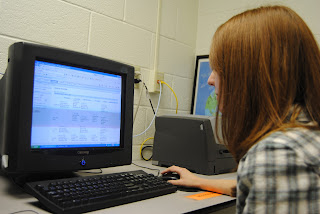FOR IMMEDIATE RELEASE
March 4, 2011
The Patriot Newspaper
University of the Cumberlands
For more information, Contact:
Kristin Gotch, Editor-in-Chief,
(606) 539-4172
kgotch0016@ucumberlands.edu
WILLIAMSBURG, Ky.--The Patriot student newspaper will release a special edition for their InPrint Creative Writing Contest co-sponsored by Campus Activity Board, expected to be out the week of April 4.
The InPrint Creative Writing Contest is the first student writing contest to be sponsored by The Patriot. The newspaper’s special edition will feature the contest’s winning pieces in non-fiction, fiction, poetry, and photography as well as short interviews with the contributors. The contest was open to all UC undergraduate students.
“Working with InPrint has been a lot of fun, and considering it was the first time The Patriot has ever been involved with a creative writing contest, I feel the contest was fairly successful;” said The Patriot's editor-in-chief, Kristin Gotch, “I’m excited to get the issue out, and I think our readers will really enjoy the content.”
Rebecca Moses, a junior, was selected as the winner in the fiction category for her short story “Another Dream” and in poetry for her poem “Muses.” Sarah Denison, a junior, placed second in poetry for her poem “Broken Icicles” and Caleb Hetrick, a sophomore, placed third for his poem “My Deck.” Zachery Bruckner, a sophomore, was selected as the winner in non-fiction for his essay “The Boardwalk and the Beach.” Anya Venn, a senior, was selected as the winner in photography for her three scenic-outdoor photos.
Judges for InPrint included Phil Meeks for fiction, Greta McDonough for non-fiction, Darnell Arnoult for poetry, and Roger Hagy for photography. Meeks is an agent for the University of Kentucky Agriculture Extension office, and his fiction has been published in “Motif 2: Come What May,” and other publications. McDonough writes a popular weekly column, “From This Place to That,” in her hometown newspaper in Owensboro, Ky. Arnoult has written two books, a book of poetry, “What Travels with Us: Poems,” and a novel, “Sufficient Grace.” Hagy is the project manager in the creative services department at University of Tennessee where he is responsible for external communications and the Torchbearer alumni magazine.
The Patriot has been the official student newspaper for University of the Cumberlands since 2002. All students and faculty are welcome and encouraged to contribute. The Patriot prints five issues each semester. Visit The Patriot’s official Facebook page at facebook.com/patriotnewspaper for assignment meeting dates and upcoming events. Also visit thepatriot.ucumberlands.edu for up-to-date UC news now online.
For more information contact student editors, Kristin Gotch: kgotch0016@ucumberlands.edu or Kate Sexton: ksexton0104@ucumberlands.edu.
###


